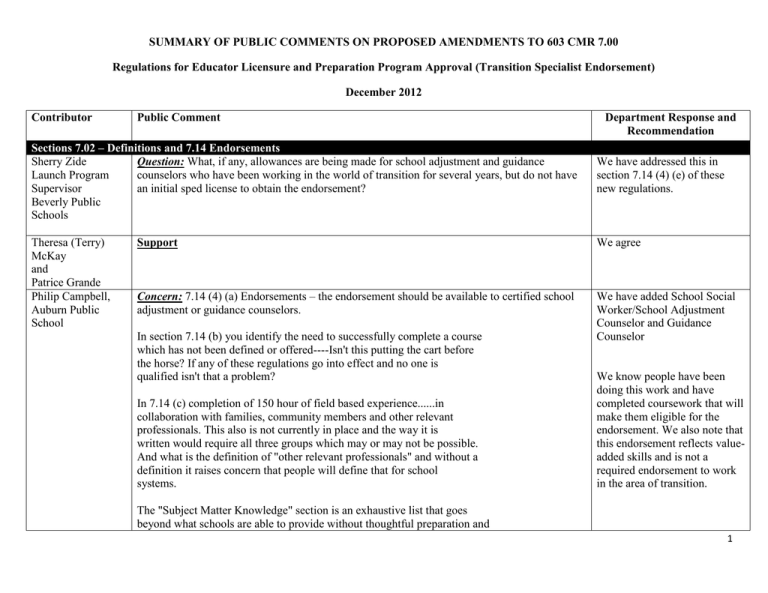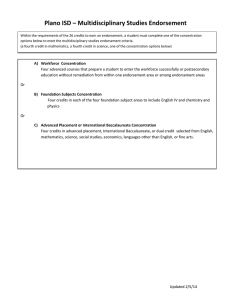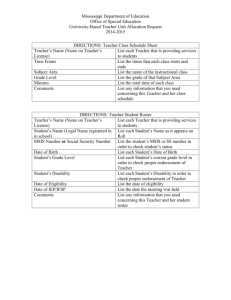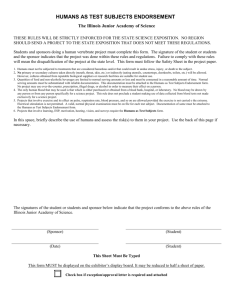item3 comment
advertisement

SUMMARY OF PUBLIC COMMENTS ON PROPOSED AMENDMENTS TO 603 CMR 7.00 Regulations for Educator Licensure and Preparation Program Approval (Transition Specialist Endorsement) December 2012 Contributor Public Comment Sections 7.02 – Definitions and 7.14 Endorsements Sherry Zide Question: What, if any, allowances are being made for school adjustment and guidance Launch Program counselors who have been working in the world of transition for several years, but do not have Supervisor an initial sped license to obtain the endorsement? Beverly Public Schools Theresa (Terry) McKay and Patrice Grande Philip Campbell, Auburn Public School Department Response and Recommendation We have addressed this in section 7.14 (4) (e) of these new regulations. Support We agree Concern: 7.14 (4) (a) Endorsements – the endorsement should be available to certified school adjustment or guidance counselors. We have added School Social Worker/School Adjustment Counselor and Guidance Counselor In section 7.14 (b) you identify the need to successfully complete a course which has not been defined or offered----Isn't this putting the cart before the horse? If any of these regulations go into effect and no one is qualified isn't that a problem? In 7.14 (c) completion of 150 hour of field based experience......in collaboration with families, community members and other relevant professionals. This also is not currently in place and the way it is written would require all three groups which may or may not be possible. And what is the definition of "other relevant professionals" and without a definition it raises concern that people will define that for school systems. We know people have been doing this work and have completed coursework that will make them eligible for the endorsement. We also note that this endorsement reflects valueadded skills and is not a required endorsement to work in the area of transition. The "Subject Matter Knowledge" section is an exhaustive list that goes beyond what schools are able to provide without thoughtful preparation and 1 time. If these regulations go into effect without a lot of work with school districts then transition services are very likely to become mired down in allegations of regulator violations and hearings. I have many years of experience in both public schools and the adult services system and believe strongly that the direction DESE is moving is the correct direction. The short time frame for promulgating these regulations may not have an intended positive impact that is desired. Massachusetts Special Educational Advisory Council, Jennie DunKley, SAC Chair Recommendation: At its October 9, 2012 meeting, the Massachusetts Special Education Advisory Council (SAC) unanimously and strongly recommended the inclusion of Guidance Counselors as staff members eligible for endorsement as Transition Specialist. Jan Hollenbeck, OTD, OTR/L Concern and Recommendation: These amendments, as written, unnecessarily limit who can receive DESE endorsement as Transition Specialist. While there is no requirement for districts to employ a Transition Specialist, these amendments will undoubtedly result in pressure for districts to employ such an individual and to have that individual possess the DESE Transition Specialist Endorsement. Occupational therapists, already employed by the public schools, are exceptionally wellqualified for the role of transition specialist and yet are excluded from these amendments. The proposed amendments provide for endorsement as a Transition Specialist only to individuals licensed as a special educator or rehabilitation counselor. Of particular note is that Rehabilitation Counselors are included and they are not licensed through the DESE, but under the MA Board of Allied Mental Health and Human Services Professions. Similarly, occupational therapists are not licensed through the DESE but under the MA Board of Registration in Allied Health Professionals (259 CMR 3.00: Occupational Therapists). I feel that the amendments as proposed do a disservice to the students in Massachusetts schools by limiting the ability of qualified individuals to serve in the capacity as transition specialist. I propose the addition of a third item to these amendments under section 4. (a) as follows: 3. A license as an Occupational Therapist (as described in 259 CMR 3.00: Occupational Therapists). We agree, and this license area has been added as eligible for the endorsement. As currently proposed, only Special Educators and Rehabilitation Specialists can obtain this endorsement. The inclusion of Guidance Counselors will benefit school districts and students with disabilities. Schools employ Guidance Counselors to help all students with career and college transition planning and bring critical knowledge in the area of post-secondary education options, resources and processes. The law does not authorize ESE to make this endorsement available to Occupational Therapists. 2 Massachusetts Advocates for Children Proposed change: section 7.14(4)(d)(1): Foundations and implementation of transition education and transition services, including but not limited to: state and federal legislation; inclusive models, research, best practice, community based education and post-school options; and knowledge of transition planning and service delivery for all students, including culturally and linguistically diverse youth. We have added some of this language Rationale: The addition of this language is important to clarify that transition specialists are required to have knowledge of how to actually implement the array of transition services within the school and community. This practical knowledge is essential for the success of transition specialists. Proposed change: section 7.14(4)(d)(2): “Individual transition assessment and system evaluation, including conducting, interpreting, and overseeing individualized formal and informal transition assessments to ascertain interests, strengths, preferences, aptitudes and needs related to competitive employment, education, training, and independent living; developing individualized appropriate measurable postsecondary goals, and annual IEP goals based on the individualized transition assessment results; and transition service delivery.” We agree and have added this language. Rationale: Best practice requires consideration of formal and informal transition assessments to adequately address a student’s interests, strengths, and needs related to education, competitive employment, training, and independent living. Proposed change: section 7.14(4)(d)(3): “How to Ddevelop ment of transition systems and supports which include best practices related to self-determination in supporting postsecondary education, competitive integrated employment (including supported employment), independent living, and community participation including, but not limited to, implementation of social skills training, positive behavioral supports, and assistive technology as related to transition goals, and development of self-determination skills across all settings. We agree and have added this language. Rationale: Self-determination skills are essential for students with disabilities to be able to live as independent and productive a life as possible. The language change clarifies that development of self-determination skills are important to address in all settings, such as the student’s current school setting. Proposed change : section 7.14(4)(d)(4): “Collaboration and leadership role including strategies for active participation of students and families in IEP development, transition education and services, and support networks; development of partnerships with employers, The endorsement reflects value-added skills in this area and ESE cannot require that 3 institutes of higher education, public agencies, and community service agencies; and provision of technical assistance and professional development to school personnel.” transition specialists play a leadership role in every district. . Rationale: Transition Specialists require competencies necessary to carry-out the pivotal role they will have as leaders in their school district. Their leadership role should be properly emphasized in the subject matter knowledge. Proposed change: section 7.14(4)(g)(2): “Successful completion of 30 professional development points (PDPs) in the content area related to 603 CMR 7.14(4)(d). The 30 PDPs may be included in the total number of PDPs necessary for license renewal pursuant to 603 CMR 44.00. “ We agree and have added this language. Rationale: This language clarifies that required PDPs address the content areas laid out in section 7.14(4)(d) in order to renew the transition specialist endorsement. Proposed change: section 7.02: Definitions - Transition Services: This term shall have the meaning given it in federal law at 20 USC 1401(34): “means a coordinated set of activities for a child with a disability that— (A) is designed to be within a results-oriented process, that is focused on improving the academic and functional achievement of the child with a disability to facilitate the child’s movement from school to post-school activities, including post-secondary education, vocational education, integrated employment (including supported employment), continuing and adult education, adult services, independent living, or community participation; (B) is based on the individual child’s needs, taking into account the child’s strengths, preferences, and interests; and (C) includes instruction, related services, community experiences, the development of employment and other post-school adult living objectives, and, when appropriate, acquisition of daily living skills and functional vocational evaluation.” The federal law referenced in the definition includes this information. If the federal law changes this definition, the state regulations in this area will, by reference, change also. Rationale: Including the full text of this important definition of transition services will help facilitate implementation. In addition, in order to appropriately address the range of competencies required by Transition Specialists, we recommend that department address the following areas in final regulations and/or guidance: This level of detail is not appropriate in regulation. However, we will take these 4 The full scope and leadership role of transition specialist School and post-school services and options available for youth with and without disabilities Ways to provide community-based education and integrated paid employment experiences available to students with disabilities that can be linked to their individual goals, interests, aptitudes, and academic instruction. How to facilitate person-centered planning to identify and build upon a student’s strengths, preferences, and interests How to identify, assess and establish natural support systems to facilitate transition to inclusive post-school options Strategies for involving students and key family members in all phases of IEP transition planning and implementation of services How to facilitate the development of self-determination, self-advocacy, and social skills across all settings in correlation with transition annual and postsecondary goals Methods for teaching job-seeking and job retention skills How to implement community-based transition education, including integrated paid employment, higher education, and independent living activities Methods to increase collaborative transition service delivery through interagency partnerships with employers, institutes of higher education, and community service agencies as well as with school personnel and families Strategies for overcoming interpersonal, infrastructural, and financial barriers to the use of best practices in transition within the school/district Details and implications of specific federal and state transition related laws and regulations including special education law, laws and regulations regarding vocational education and rehabilitation, labor laws, and civil/disability rights issues. Emphasis on the importance of teaching “soft skills” to bolster performance in employment settings such as teamwork, problem-solving, critical thinking and effective communication. Thorough understanding of how to provide age appropriate transition planning, assessments and services for all youth ages 14-22 Methods of formal and informal assessments including a focus on the difference between community-based and school-based assessments and a detailed examination of the purpose of each. Analysis of the role of technology in transition with a focus on how augmentative and alternative communication/assistive technology can be used across all settings to foster independence. comments into consideration when developing the guidance document. 5 Ability to develop individualized measurable transition goals and objectives. Methods, models and curricula for post-secondary education and vocational and career preparation Arlyn Roffman, Support and Recommendation: Ph.D. We support the recommendations and testimony of the Massachusetts Advocates for Children Professor of Special (MAC). Education Lesley University and Frank Sally and Leo Sarkissian, The Arc of Massachusetts See above Janet Fitzgerald Support and Recommendation: I think that the new regulations for transition specialist endorsement are great. I suggest that in addition to Special Education teachers and VR counselors, Guidance Counselors, who have the competencies be eligible for the endorsement. We agree and have added this license category. Dawn Trainor, M.Ed Evaluation Team Leader/Transition Coordinator Saugus High School Question: I am writing to inquire about whether a person in my position would be considered grandfathered in for a Transition Specialist endorsement, given my qualifications/job experience. In short, I am wondering if others, like myself, would be excluded from this endorsement if they have not met the Initial License requirement of two years by December 2013. We have extended the timeline to December 31, 2014. Tim Clark Recommendation: There should be more flexibility for those who do not meet the license or degree requirements to obtain the endorsement thus opening the doors for minority business owners or retired government officials to become transition specialists. 7.02: Definitions: New Definition: Rehabilitation Counselor: A licensed educator who performs, in a school setting, the duties usually ascribed to that title. MTA’s proposed definition removes the problems created when DESE has to provide endorsements for individuals not licensed by DESE. This definition clearly requires those eligible for an endorsement to be licensed educators We believe the regulations do offer flexible options for this endorsement. The law requires ESE to make the endorsement available to Rehabilitation Counselors. Massachusetts Teachers Association (MTA) Add Language: 6 1. An Initial or Professional license as a Teacher of Students with Moderate Disabilities, Teacher of Students with Severe Disabilities, Teacher of the Visually Impaired, or Teacher of the Deaf and Hard of Hearing. We agree and have added this language. 2. A license as a Rehabilitation Counselor (as described in 262 CMR 4.00), or certification as a Rehabilitation Counselor as determined by the Commission on Rehabilitation Counselor Certification (CRCC). See above. As written the proposed amendment excludes those who already hold a Professional license from meeting the prerequisite license requirement By adopting MTA’s proposed definition of rehabilitation counselor (above) this subsection is unnecessary. (e) Candidates with previous employment coordinating school-based transition services who can demonstrate that they meet the subject matter knowledge and skills requirements set forth in 603 CMR 7.14(4)(d) will be exempt from the requirements set forth in 603 CMR 7.14(4)(b) and (c) if they apply for the endorsement no later than December 31, 2013 2014. We agree and have extended the timeline. One year is not sufficient time for current employees who qualify to exercise this option. Making this option practically available to current employees will require significant outreach to practitioners in the field. Notification to superintendents is not effective. MTA urges the Department to notify directly all educators who hold any of the prerequisite licenses. EPIMS and ELAR should be an adequate source of current contact information. Commonwealth Teacher Education Consortium (COMTEC) 1. We support the development of endorsements that recognize specializations within and across licenses. 2. We encourage the addition of language with regard to independent living in Subject Matter Knowledge (d)2 (…related to competitive employment, education, training, and independent living…). Language that recognizes other living options that an individual may choose or be interested in, including but not limited to a variety of supporting living models, should be included. We also recommend adding specific language regarding daily living skills and functional vocational assessment be included in (d)2 or (d)3, as We agree We agree with the concept and will use this recommendation in the development of the guidance document. We note that the IDEA definition of transition is already incorporated completely by 7 these are part of the IDEA definition of transition services. 3. It appears this Transition Specialist endorsement is designed for educators working with high school students transitioning to post-secondary/adult life. This should be specified more clearly, as IDEA also requires transition services from Early Intervention (IDEA Part C) to Preschool services. If the Early Intervention to Preschool services transition planning is also included in the Transition Specialist endorsement, then the prerequisite licenses and subject matter knowledge should be amended to reflect this. reference. The appearance you note is correct; this endorsement is designed for transition to postsecondary adult life. No changes have been made to regulations. 8




